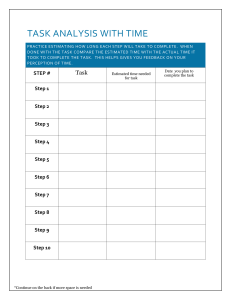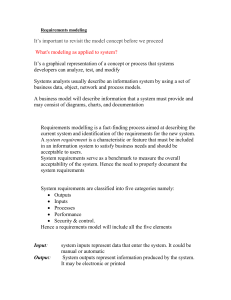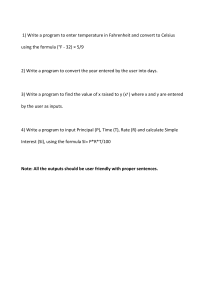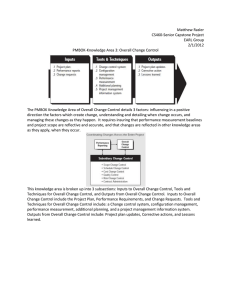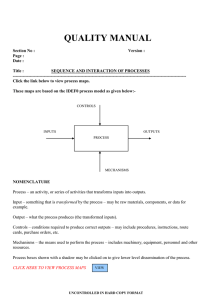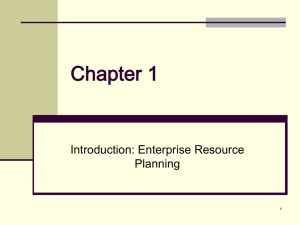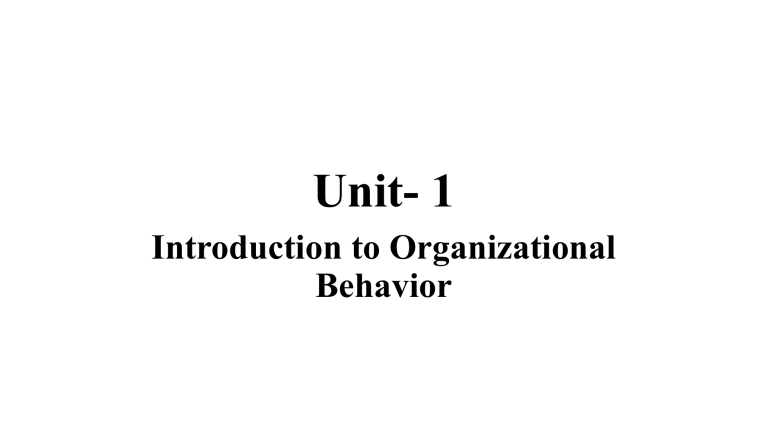
Unit- 1 Introduction to Organizational Behavior Concept of organizational behavior • OB is the study of human behavior in organizational settings, of the interface between human behavior and the organization, and of the organization itself. • The study of how people behave in and around an organization and how their behavior affects organizational performance • Concerned with analyzing, understanding, predicting, and managing human behavior for improving organizational effectiveness • It involves many activities which is essential for improving job performance, increasing job satisfaction, promoting innovation and encouraging leadership Definitions • “OB can be defined as the understanding, prediction and management of human behaviour in organisations” – Luthans • “OB is a field of study that investigates the impact that individuals, groups and structure have on behaviour within organisations for the purpose of applying such knowledge toward improving an organisation’s effectiveness” - Robbins Organizational Behavior System Inputs 1. Individual Inputs § Ability § Skills § Mental Condition § Age § Gender § Physical Condition 2. • • • Group Inputs Group Status Group Role Unman Relations 3. Organizational Inputs • Organizational Structure • Culture Processing 1. Individual Process • Motivation • Perception • Learning • Participation 2. Group Process • Communication • Leadership • Conflict • Power and Politics 3. Organizational Process • Design of formal organization • HR Policies & Practices • Interaction with external Environment Feedback 1. • • • Outputs Individual Outputs Productivity Satisfaction Turnover less Absenteeism 2. • • • Group Outputs Group Productivity Group Satisfaction Cooperation 3. Organizational Output • Organizational Citizenship • Goal Achievement • Social Effectiveness Basic Assumptions of Organizational Behavior 1. The Assumption about Nature of People a. Individual Differences: perception, attitude, intelligence, physique, personality, learning capability, communicative ability etc. b. A Whole Person: every individual involves special skills, likes and dislikes, pride and prejudices. c. Motivated Behavior: financial and non-financial d. Value of the Person: all the employees have feeling dignity and respect, fair and equitable treatment, opportunity to use skills and knowledge, open trusting and communication, opportunity to make decisions, adequate and fair compensation and safe and healthy work environments e. Selective Perception: every individual has a unique ways of sensing, collecting, organizing, and interpreting information received from environment f. Desire for Involvement: want to show their creativity, skills and efficiency 2. The Assumption about Nature of Organization a. Social System: organizations are the part of social system b. Mutuality of Interest: both the organization and people need each other c. Ethical Treatment: set of moral principles and rules guiding individual behavior Levels of OB analysis 1. Individual level analysis: learning, perception, creativity, motivation, personality, turnover, task performance, cooperative behavior, ethics and value 2. Group level analysis: group dynamics, group performance, intra-group and intergroup conflict and cohesion, leadership, power and politics, norms, interpersonal communication 3. Organizational level analysis: organizational culture, structure, cultural diversity, cooperation and conflict, change, technology Contributing Disciplines to the field of OB 1. Psychology: it is a science that wants to measure and explain the change in human behavior 2. Sociology: it is the study of a people in relation to their fellow human beings 3. Social-psychology: it focuses on the influence of the people on one another 4. Anthropology: it is the science of human being especially of their environment and social relations and their culture 5. Political science: it focuses on conflict, intraorganizational politics and power Contributing disciplines • https://www.youtube.com/watch?v=b7xoWDKCqW8 Challenges for Managers 1. Responding to globalization 2. Managing workforce diversity 3. Improving quality and productivity 4. Improving people skills 5. Improving customer service 6. Empowering employees 7. Managing change 8. Improving ethical behavior 9. Managing information technology 10. Coping with temporariness Assignment 1. What is organizational behavior? Explain the assumptions of organizational behavior. 2. Discuss about the organizational behavior system. 3. Describe the contributing disciplines of organizational behavior. 4. Explain any five challenges for the managers of organizational behavior.
